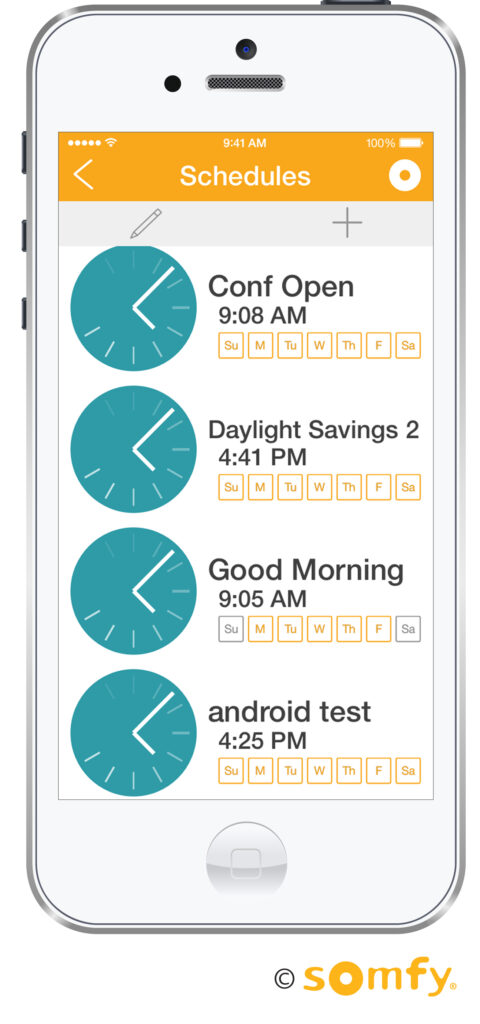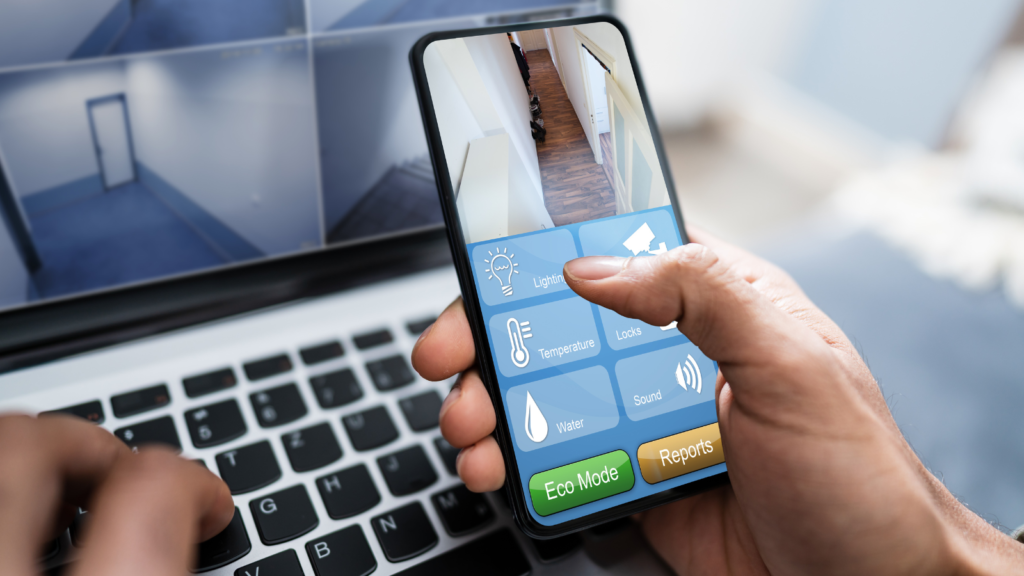Increase Security & Lower Bills While You Travel
How would you feel knowing you could increase security and lower bills while you travel away from home? Now that it’s summer, many of us travel for fun, or maybe your work puts you on the go more often than not. We know basic tips for home security while we’re gone, like having someone pick up your mail, or using timers on lights. In this day and age, fortunately, there are many more options available to make your home safer! Even window coverings, like motorized shades or automated blind programming, can be used to not only increase your home’s security, but lower your bills. How? Read on!
(We’ll also add in some generic tips, just in case you’re looking for overall information on home security while you’re out.)
Make it look like someone’s home
 SmartHome technology makes this much easier, of course. Now you can connect lightbulbs, televisions, and so much more to phone apps, or set schedules. In interviews, inmates who were charged with burglary said that TVs or radios implied someone was home. But did you know that you can do the same thing with your blinds, shades, or drapery? This is important as well, as window coverings that are always closed are a dead giveaway that no one is there.
SmartHome technology makes this much easier, of course. Now you can connect lightbulbs, televisions, and so much more to phone apps, or set schedules. In interviews, inmates who were charged with burglary said that TVs or radios implied someone was home. But did you know that you can do the same thing with your blinds, shades, or drapery? This is important as well, as window coverings that are always closed are a dead giveaway that no one is there.
When you purchase motorized window coverings through us, you also get the benefit of increased technology at your fingertips.
How to use automated window coverings for home security:
- Program window coverings to open and close at set times during the day to mimic someone being home. Just ensure open window coverings don’t reveal enticing high-priced items (see the list below for more information on what to keep out of sight).
- Open and close or adjust window coverings remotely from a phone app randomly during the day to show variation outside the schedule. This is far preferred, as it doesn’t imply a clear window of time when you would be “at work” and therefore your home empty.
- Connect your window coverings to your overall smart home system. This way you can program multiple things, like your TV, window coverings, and even lights to have varying schedules from day-to-day to really give the impression that someone is always home.
- Keep window coverings closed at night but with lights on inside. At night, lights on inside a home make it really easy to see everything going on from the dark street. If you have window coverings such as solar shades that don’t grant privacy, consider layering with draperies that are automated as an additional layer.
- Bonus: If you love shutters which can’t be motorized, you’re not out of luck. Shutters that are closed are seen as an additional barrier that must be broken through.
How does automation save me money?
Home security is important, but so is saving money! And if you’re traveling for fun, often we need all the savings we can get after a vacation splurge. Even when you’re home and not traveling, the benefits still exist. Added security plus year-round money savings? Yes please!
When you install smart window coverings, you also get enhanced control. All the ways we mentioned above that you can control window coverings give you extra benefits in savings. It’s worth mentioning that the US Department of Energy says even quality, double-paned windows still lose about 30% of paid-for energy out the windows. Worse, in hot seasons, 76% of sun that hits those windows enters your home as heat. That’s a lot of extra work your heater or cooler has to make up for, which equals extra energy costs for you.
How do you reduce your bills with window coverings?
- Program window coverings to close before the sun hits the window. This way the hot air doesn’t get in and drive up your energy bills during the time when your air conditioner is on.
- During colder months, lower your electric bills by allowing sunlight to help heat your home through the windows. Then close the window covering when the sun is no longer hitting the windows. Just be aware that UV rays, even while indoors, can still damage your furniture, rugs, hardwood floors, and artwork.
- Choose energy-efficient window coverings for windows that really need it. Cellular shades are king in this department, especially when installed tightly inside the window frame by professionals. They can reduce loss of heat during cold months by 40%, and additional heat during hot months from direct light by 60%. That’s 10% or 20% energy use savings, respectively, for you and your wallet! Even blinds that are reflective can help a lot, though. So can draperies and roman shades, as the fabric provides a layer of insulation that can help prevent heat loss or gain, though the type of fabric and fit to the window can make the amount vary significantly.
- Bonus: While not window coverings, unplugging any electronics that you are not using for home security purposes can not only save you energy and money, but also protects them in case of a power surge.

Understanding & preventing your home from being a target
Contrary to popular belief, most home robberies don’t happen at night. Most happen between 6am – 6pm, with the majority between 10am – 3pm! That’s because many burglars tend to watch a home for a period of time in order to understand your routine, your work schedule, and more. Understanding what they look for can help reduce your likelihood of joining the ranks of the 2.5 million annual robbery victims in the United States. Thankfully California’s rate of burglary is lower than other states, but it’s also not the lowest, so take a little care before traveling. That way you can enjoy your trip without worry!
- Close and lock your windows and doors. Most homes that are robbed are simply… unlocked. Whether your windows or doors, make sure locking them is a habit everyone in your home follows. Even a cracked window is an open invitation, so ensure if you must leave them open, you install a cheap, simple window guard. These are either clips or strips that prevent the window from being opened any further than what you set it to. Though ensure you can’t reach through the gap inside to remove the guard, of course. You can also install these for sliding doors, which isn’t a bad idea if you’re going to be gone for a bit or often.
- Leave a TV or radio on. This is a large deterrent for would-be burglars. Sound from inside the home implies occupancy. If you have control via a phone app, changing channels periodically isn’t’ a bad idea at all. Ensure it’s loud enough to be heard from closely outside the home.
- Don’t keep cash or purses out. This is fairly obvious, but if your purse, wallet, or cash are out in the open and visible from windows or doors, you’re making a quick grab easy and inciting. Store these somewhere safe, out of sight of guests and line of sight into your home. Same goes with expensive collectables and jewelry, and electronics. If they’re visible from your windows especially, it’s advertised to the outside.
- Keep things neat. They look for homes that look not as neat as others – whether that’s a messy yard, untrimmed bushes and trees, or laundry piled on the couch near a window. It implies your home is less organized as well, and security systems are something they look for. Also your trees and bushes may provide additional cover and blind spots are a thing people look for. Having children and their associated and often unavoidable mess, however, actually decreases the likelihood of robberies. Kid toys, check. Adult messes, not so great.
- Replace worn doors and window frames. Similarly to the above, cheap, worn, and old window frames and doors are a target. Not only does this imply you may not have a security system, but it also will be easier to break or pry open. If you can’t replace them, try to refinish them so they don’t appear worn or weak from age.
- Don’t hide keys outside. You may think your fake rock or magnet under a ledge is secret but… it’s not. Not only do they know what they look like, but if you ever access it in plain sight of the street or other areas, you’re advertising its location. Consider a smart lock with a code or phone app if you’re prone to losing your key. One in eight burglaries are done with keys obtained prior.
- Have – or fake – a big dog. Our dog friends are actually a great deterrent as well – as long as you actually have a dog or real dog items. Just a “Beware of Dog” sign absent of any dog toys, food and water bowls, etc. is not enough to convince a practiced robber of the existence of Fido. Even if you have a dog, if it’s little, it’s really not much of a threat.
- Don’t advertise your NRA membership. If you own firearms and NRA stickers or signs around your home, you’d believe that would be a deterrent, right? Unfortunately it’s not. Homes with NRA stickers on the cars in the driveway advertise that you likely own many guns, and this equals many high priced weapons to sell.
- Watch your mail. We already mentioned arranging for someone to get your mail. It’s a dead giveaway that you’ve been away if mail is piling up. If you don’t have someone who can pick it up for you, you can file a temporary hold easily (and for free) at your post office before you head out the door. Then you simply pick up your mail upon your return, and resume normal service.
- Don’t broadcast your trip or expensive items online. If you post on social media, especially public accounts, about vacation, you’re basically putting up a sign saying “House is empty!” so make sure to lock those posts down or better yet, tell only friends in private settings. Likewise, if you receive any expensive gifts, especially jewelry, consider your audience before posting it online.
- For Sale & newly purchased homes are at increased risk. A “For Sale” sign on a lawn often is like permission for a burglar. After all, they know that real estate agents, movers, contractors, and prospective buyers will be in and out. It makes it easy for them to slip in unnoticed alongside a group (especially in Open Houses). It also often means security systems are inactive, since there is often a gap between moving in and setting up your cameras or security system with home internet.
- Install cameras and motion lights. Security cameras do make a difference, as do motion sensor lights. Combination camera and light options are readily available, and most connect these days to SmartHome systems. Amazon’s Ring camera can even display the feed on your web browser, smart device, or even your TV if you have a Fire Stick. These are very effective deterrents. Keeping outdoor lights on at night when you’re home AND when you’re gone also helps provide additional security. Lights and clear visibility of your home functions as a great deterrent.
- Check IDs of anyone at your home. We’ve all had door-to-door salesmen stop by. Or city utility workers who need access to our yard or our home. However, do you ask them to see their ID? If not, start. Every inmate answered yes to the question “Did you knock on the door first?” in an interview. Many also said they pose as people who are lost, looking for a lost dog, getting people to take surveys, or even saying they had the wrong house. Likewise, don’t allow delivery people to enter your home or leave your door wide open. Step outside and close it, or just crack it open but block their inner view with your body.
- Leave a car in the driveway. I know many of us love our garages, but a car in the driveway signals someone is home. Ensure of course that it’s locked, doesn’t contain valuables, and doesn’t have a spare key magnet, of course. Also remove or hide your garage door opener. That’s essentially a key to your house too, after all.
It’s worth noting, if you’re going to travel and will be making notable changes to the exterior of your home, do it well in advance of your vacation or business trip. Otherwise it can also function as a sign that you plan on leaving.
